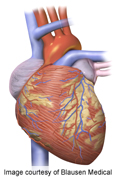
WEDNESDAY, Nov. 7 (HealthDay News) — A synthetic form of a hormone that ramps up during pregnancy might prove to be a powerful new drug against tough-to-treat heart failure.
Researchers who presented data from a study this week at the American Heart Association annual meeting in Los Angeles said the drug, serelaxin, shows promise.
But experts were cautious, saying the findings need to be repeated in larger trials.
“If we did replicate this finding, it would be an extraordinary advance in the care of acute heart failure, for which we have no disease-modifying or life-saving therapies,” said Dr. John McMurray, professor of cardiology at the University of Glasgow, in Scotland, who commented on the study during an AHA press briefing.
Serelaxin is the lab-created version of a natural hormone in men and women called human relaxin 2. Relaxin circulates in low levels in humans, but spikes dramatically in women during pregnancy.
As study author Dr. John Teerlink explained at the briefing, “pregnancy is a physiologic state where there are marked improvements in cardiac, arterial and [kidney] function, and these are exactly the kinds of changes that we’d like to see in acute heart failure.”
In humans, relaxin also has been shown to improve blood flow and cut down on inflammation, so scientists thought it might help fight heart failure.
In heart failure, the heart is damaged (often by a heart attack) and becomes inefficient, leading to chronic weakness and shortness of breath. The condition is often fatal, and there has been no real advance in treating the disease for decades.
In the study, Teerlink and his colleagues randomly assigned more than 1,600 hospitalized heart failure patients with an average age of 72 to receive either 30 micrograms per day of serelaxin or a placebo via a 48-hour infusion.
Patients received the medication within 16 hours of their hospitalization due to shortness of breath plus a drop in kidney function. They also were given standard diuretics to help remove excess liquid from the body and to ease swelling.
Three-quarters of the patients in the study were men, and they tended to be very sick, with multiple conditions such as high blood pressure, high cholesterol, heart disease, diabetes and prior stroke.
Serelaxin did seem to have a benefit, with shortness of breath easing by 20 percent on average, Teerlink said. The team found that patients on the medication also had 43 percent fewer episodes of heart failure symptoms while in the hospital, they cut short their stay in the ICU by half a day on average and their total hospital stay was cut by a full day on average, compared to patients taking the placebo.
Over the longer term, the researchers reported, patients taking serelaxin were 37 percent less likely to die from any cause (including heart disease) six months after beginning treatment, compared to those on placebo.
There was one unusual finding, however: Use of the drug did not cut down on rehospitalizations, nor did it cut down on deaths from heart failure specifically.
McMurray said that finding has made him a little cautious in his response to the study. “It’s very unusual to see a treatment in heart failure that can improve survival but not reduce rehospitalization,” he said.
The drug’s safety profile seemed fine, however. “Serelaxin was well-tolerated and safe, with no differences in adverse events or serious adverse events” between the treated and placebo groups, said Teerlink, who is a professor of medicine at the University of California, San Francisco.
The study was funded by drug company Corthera Inc.
The need for a new, effective treatment for heart failure is so dire that experts said they would immediately prescribe serelaxin for their patients — if the findings from this trial are replicated and the drug is approved.
“If this drug reduces mortality — if that mortality finding is real — boy, are we going to get excited,” said Dr. Elliott Antman, a cardiologist at Brigham and Women’s Hospital, in Boston. “The real question is whether the mortality difference seen in this trial is a true and replicable finding.”
But another expert noted that initial trials of promising new medicines for heart failure have raised false hopes in the past.
Dr. Mariell Jessup is medical director of the Penn Medicine Heart and Vascular Center at the University of Pennsylvania Perelman School of Medicine, in Philadelphia, and president-elect of the American Heart Association.
“We have very little that we can use in the hospital” for heart failure, Jessup said, so the advent of a drug like serelaxin “would be an exciting find.”
“But I also agree with the caveats that we’ve heard — that it’s a small trial and maybe we’ve been misled,” she added.
Experts also stress that findings presented at medical meetings are typically considered preliminary until published in a peer-reviewed journal.
More information
Find out more about heart failure at the U.S. National Heart, Lung, and Blood Institute.

